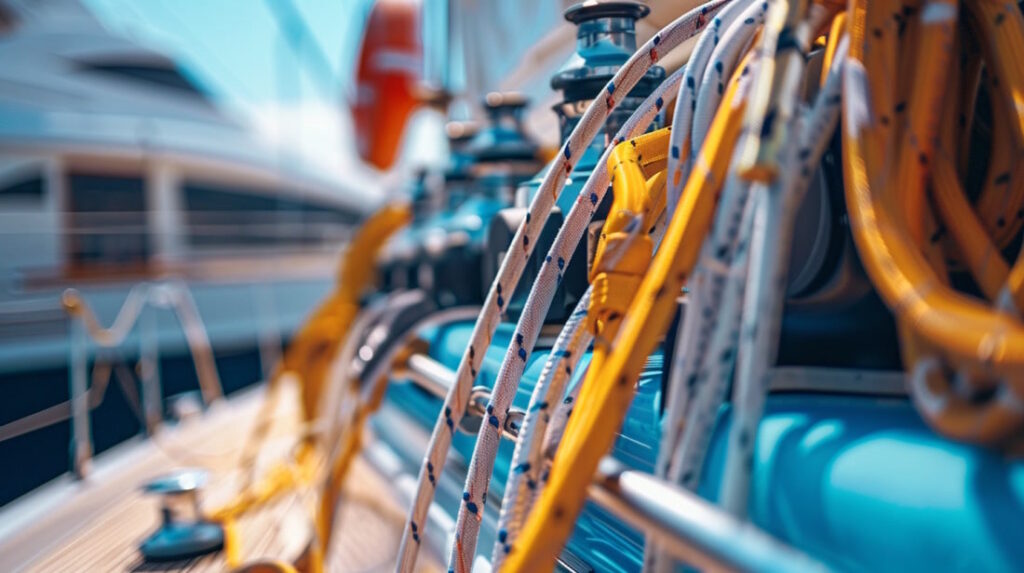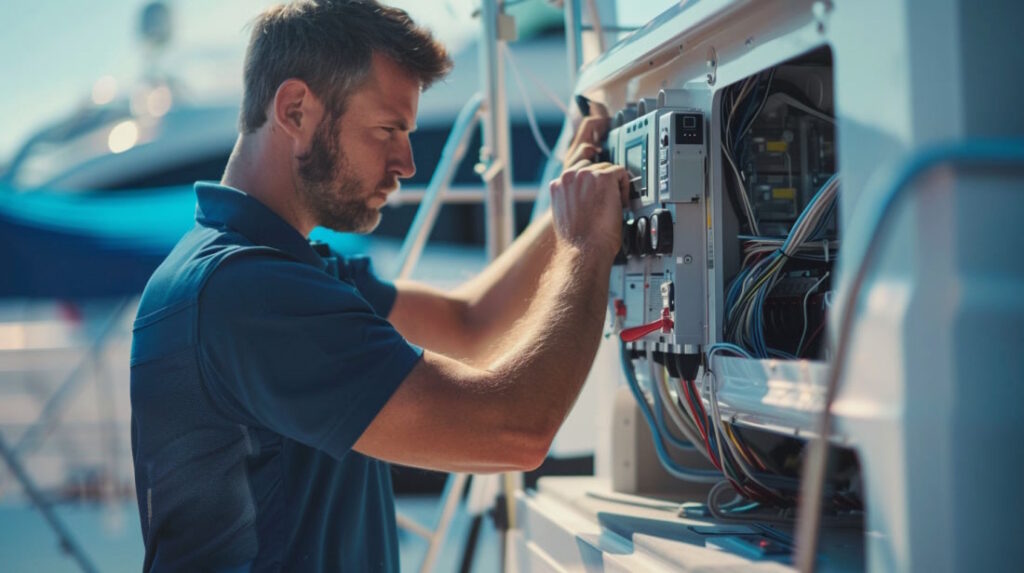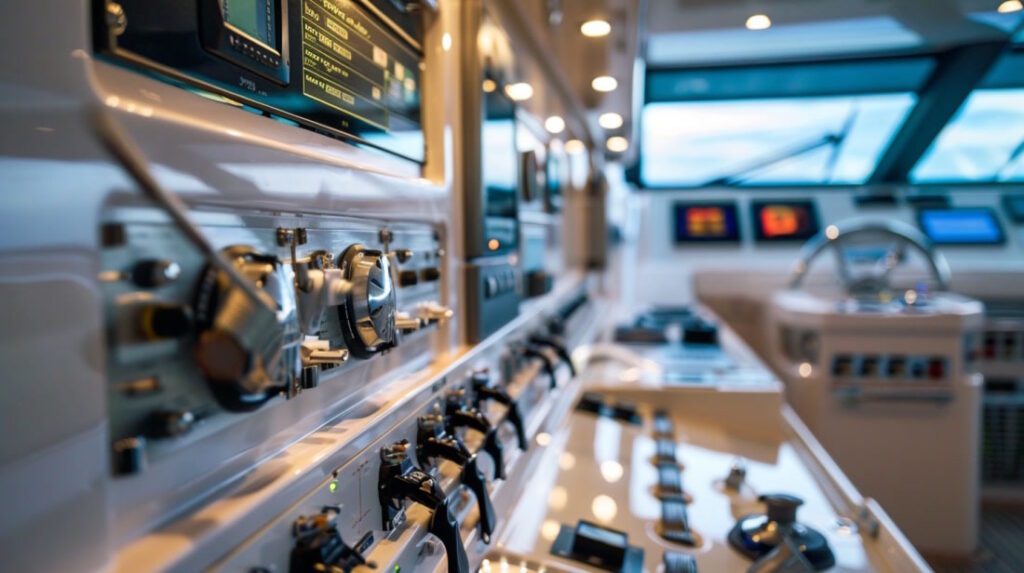Maintaining your yacht’s electrical systems is paramount for ensuring both safety and functionality while at sea. Electrical systems on a yacht are complex, comprising various components that must work together seamlessly.
Regular maintenance not only extends the lifespan of these systems but also prevents potentially dangerous situations. Learn how to maintain your yacht’s electrical systems to keep your vessel in top condition.
Understanding Your Yacht’s Electrical Systems
The electrical systems on a yacht are akin to the circulatory system in a living organism. They provide power to different parts of the ship, ensuring smooth operations and the necessary comfort and safety at sea. Understanding these systems is essential for effective maintenance and troubleshooting.
Power Generation Sources
A yacht’s electrical system relies on multiple power sources to generate electricity. The primary sources include:
- Batteries: These store electrical energy and supply it to the yacht’s systems when needed. Marine batteries are specifically designed to withstand the harsh marine environment and provide a steady power supply.
- Generators: Generators produce electricity by converting mechanical energy into electrical energy. They are often used to power larger yachts and provide a continuous power supply when the engines are off.
- Shore Power: When docked, yachts can connect to shore power to draw electricity directly from the marina’s grid, allowing onboard systems to function without depleting the yacht’s batteries.
Electrical Distribution Systems
The generated electricity needs to be distributed efficiently across the yacht. This is managed through an intricate network of distribution systems, including:
- Switchboards and Panels: These centralize control over the yacht’s electrical distribution, allowing for the management and monitoring of power flow to various systems.
- Wiring and Cables: High-quality marine-grade wiring is essential to withstand the marine environment’s stresses and prevent corrosion and wear.
- Circuit Breakers and Fuses: These safety devices protect electrical circuits from overloads and short circuits, automatically disconnecting power when a fault is detected.
Power Conversion Components
Electrical power often needs to be converted to different voltages or types of current to be usable by different systems on board. Key components include:
- Inverters: Convert DC (Direct Current) power from batteries to AC (Alternating Current) power, which is used by most household appliances.
- Converters: These devices can convert shore power to match the yacht’s electrical system requirements, ensuring compatibility and safe operation.
Control and Monitoring Systems
Modern yachts are equipped with sophisticated control and monitoring systems that enhance safety and convenience. These include:
- Electrical Panels: Allow crew to control power distribution manually.
- Monitoring Systems: Provide real-time data on the status of electrical systems, including battery levels, power consumption, and generator performance.
- Automation Systems: Advanced yachts may use automation to optimize power usage and manage systems efficiently, reducing the need for manual intervention.
Critical Electrical Systems
Several systems on a yacht are critical and must always be operational:
- Navigation Systems: These include GPS, radar, and other navigational aids that rely on a stable electrical supply.
- Communication Systems: Radios, satellite phones, and other communication devices are essential for safety and require reliable power.
- Lighting Systems: Interior and exterior lighting, including emergency lights, must be dependable.
- Bilge Pumps: These are crucial for preventing water ingress and potential flooding.
Integration with Mechanical Systems
Yacht electrical systems are often integrated with mechanical systems, such as engines and propulsion systems. This integration ensures that electrical power is available for starting engines and operating essential mechanical components.
Energy Efficiency and Environmental Considerations
With increasing awareness of environmental impacts, many yacht owners are adopting energy-efficient practices and integrating renewable energy sources:
- Solar Panels: These can be installed to supplement power needs, reducing reliance on generators and batteries.
- Energy Storage Systems: Advanced battery technologies, such as lithium-ion, offer higher efficiency and longer life spans compared to traditional lead-acid batteries.
- LED Lighting: Replacing traditional lighting with LED can significantly reduce power consumption.
Maintenance and Upkeep
Understanding the various components and their functions is the first step toward effective maintenance. Regular inspections, cleaning, and testing are essential to ensure that all parts of the electrical system are functioning correctly. This proactive approach not only prevents potential failures but also extends the lifespan of your yacht’s electrical systems.
By comprehensively understanding your yacht’s electrical systems, you can ensure that your vessel remains safe, functional, and ready for any adventure on the water. This knowledge also empowers you to troubleshoot minor issues and know when to seek professional help, ultimately enhancing your overall yachting experience.

Importance of Regular Maintenance
Regular maintenance of your yacht’s electrical systems is not just a matter of ensuring smooth operations; it’s a crucial aspect of safety, reliability, and longevity. The importance of maintaining these systems cannot be overstated, as it helps prevent potential failures, reduces repair costs, and enhances your overall boating experience.
Ensuring Safety on the Water
One of the primary reasons for regular maintenance is safety. Electrical systems on a yacht control critical functions, such as navigation, communication, and lighting. A failure in any of these systems could lead to dangerous situations, particularly when you’re far from shore. Regular maintenance ensures that all components are functioning correctly, significantly reducing the risk of accidents caused by electrical failures.
- Fire Prevention: Faulty wiring, overloaded circuits, and poor connections can lead to electrical fires. Regular inspections and maintenance help identify and rectify such issues before they escalate.
- Reliable Communication: In emergencies, reliable communication systems are essential. Regular checks ensure that radios and satellite phones are always operational.
- Navigation Accuracy: Properly maintained electrical systems ensure that navigation tools like GPS, radar, and depth sounders provide accurate data, essential for safe sailing.
Preventing Costly Repairs
Neglecting routine maintenance can lead to significant breakdowns that are often expensive to repair. By performing regular checks and servicing, you can identify and address minor issues before they develop into major problems.
- Early Detection: Regular inspections allow for the early detection of potential issues, such as corroded terminals or worn-out wiring, which can be fixed relatively cheaply compared to major system overhauls.
- Prolonged Equipment Life: Well-maintained electrical components last longer, reducing the frequency and cost of replacements.
- Efficient Operation: Maintaining your electrical systems ensures they operate efficiently, reducing wear and tear on other connected systems, such as engines and mechanical components.
Optimizing Performance and Reliability
A well-maintained electrical system is key to the optimal performance and reliability of your yacht. Regular maintenance ensures that all systems function as intended, providing a seamless and enjoyable experience on the water.
- Consistent Power Supply: Proper battery maintenance and generator servicing ensure a consistent and reliable power supply, crucial for all onboard activities.
- System Efficiency: Regular cleaning and inspection of inverters, converters, and wiring ensure that your electrical system operates at peak efficiency, reducing power wastage.
- Enhanced Comfort: Reliable electrical systems mean uninterrupted use of amenities like air conditioning, entertainment systems, and kitchen appliances, enhancing your comfort and convenience.
Boosting Resale Value
A well-maintained yacht retains its value better than one with a history of neglect. Regular maintenance records can be a strong selling point when you decide to sell your yacht, as they demonstrate that the vessel has been well cared for.
- Documented History: Keeping detailed records of all maintenance activities shows potential buyers that the yacht has been properly maintained.
- Appealing to Buyers: A yacht with a documented history of regular maintenance is more attractive to buyers, who are likely to perceive it as a lower-risk investment.
- Higher Resale Price: Well-maintained yachts generally command higher resale prices, as buyers are willing to pay more for a vessel that promises reliability and longevity.
Environmental Responsibility
Regular maintenance also plays a role in environmental stewardship. Properly functioning electrical systems are more energy-efficient and reduce the risk of harmful incidents like oil spills from poorly maintained generators.
- Energy Efficiency: Regular maintenance ensures that all electrical components, such as batteries and generators, operate efficiently, reducing energy consumption and minimizing environmental impact.
- Pollution Prevention: Well-maintained electrical systems are less likely to fail and cause environmental hazards, such as oil leaks or battery acid spills.
- Sustainable Practices: Adopting regular maintenance routines promotes sustainable boating practices, contributing to the preservation of marine environments.
Legal and Insurance Compliance
Maintaining your yacht’s electrical systems can also be a matter of legal and insurance compliance. Many jurisdictions and insurance policies require regular inspections and maintenance to ensure the vessel’s safety.
- Regulatory Compliance: Regular maintenance helps ensure that your yacht meets all local and international safety regulations, avoiding fines and legal issues.
- Insurance Requirements: Many insurance policies mandate regular maintenance checks as a condition of coverage. Fulfilling these requirements ensures that your insurance remains valid and can prevent claim denials in the event of an incident.
- Peace of Mind: Knowing that your yacht complies with all safety and insurance requirements provides peace of mind, allowing you to enjoy your time on the water without concerns about potential liabilities.
Maintaining Operational Readiness
Regular maintenance ensures that your yacht is always ready for use. Whether planning a long voyage or a short weekend trip, a well-maintained yacht minimizes the chances of unexpected issues, ensuring that you can enjoy your time on the water without interruptions.
- Readiness for Voyages: Regular checks and servicing mean that your yacht is always prepared for immediate departure, saving time and reducing stress.
- Dependability: A yacht with a consistently maintained electrical system is more dependable, ensuring that all systems function correctly when needed.
- Enjoyment and Comfort: Regular maintenance contributes to a worry-free yachting experience, allowing you to focus on relaxation and enjoyment rather than dealing with unexpected repairs.

Common Electrical Issues
Maintaining your yacht’s electrical systems involves understanding and addressing common electrical issues that can arise. These problems, if left unchecked, can lead to significant inconveniences, costly repairs, or even dangerous situations. By being aware of these issues and knowing how to address them, you can ensure the safety and reliability of your yacht’s electrical systems.
Battery Failure
Batteries are the heart of your yacht’s electrical system, providing power for starting engines, running navigation systems, and supporting onboard amenities. However, they are also one of the most common sources of electrical issues.
- Aging and Deterioration: Over time, batteries lose their capacity and efficiency. Regularly checking the age and performance of your batteries is crucial.
- Sulfation: This occurs when lead sulfate crystals build up on the battery plates, reducing the battery’s capacity. Using a quality battery charger and regular equalizing charges can help prevent this.
- Corroded Terminals: Corrosion at the battery terminals can cause poor connections and reduced power delivery. Regularly cleaning the terminals and applying a protective coating can prevent this issue.
- Undercharging or Overcharging: Incorrect charging can significantly shorten a battery’s lifespan. Using a smart charger that adjusts the charge rate based on the battery’s condition can help maintain optimal battery health.
Corrosion
Corrosion is a significant issue for any marine environment, affecting various electrical components on a yacht.
- Wiring and Connectors: Saltwater exposure can corrode wiring and connectors, leading to poor connections and electrical failures. Using marine-grade wiring and connectors with corrosion-resistant properties can mitigate this issue.
- Terminal Blocks and Fuse Panels: These components are particularly vulnerable to corrosion. Regular inspections and cleaning, along with the use of anti-corrosion sprays, can help maintain their integrity.
- Switches and Relays: Corroded switches and relays can lead to intermittent electrical issues. Ensuring these components are protected from moisture and regularly checking their condition can prevent failures.
Short Circuits
Short circuits occur when electrical current flows along an unintended path, often resulting in overheating and potential fires.
- Damaged Insulation: Insulation damage can expose wires, leading to short circuits. Regularly inspecting wiring for signs of wear and replacing damaged sections is essential.
- Improperly Installed Equipment: Incorrect installation of electrical components can create short circuits. Ensuring all installations follow manufacturer guidelines and marine electrical standards can prevent these issues.
- Water Intrusion: Water entering electrical systems can cause short circuits. Properly sealing electrical components and using waterproof connectors can protect against water intrusion.
Overloaded Circuits
Overloading occurs when more current is drawn than the circuit can handle, potentially causing overheating and damage to electrical components.
- Inadequate Circuit Design: Circuits not designed to handle the yacht’s electrical load can easily become overloaded. Ensuring your electrical system is designed and installed by qualified professionals can prevent this.
- High-Power Appliances: Using high-power appliances simultaneously can overload circuits. Distributing electrical loads appropriately and using dedicated circuits for high-power devices can mitigate this risk.
- Circuit Breaker Failures: Circuit breakers protect against overloads, but they can fail or become less effective over time. Regularly testing and replacing faulty breakers is essential for preventing overloads.
Voltage Drops
Voltage drops occur when the electrical voltage decreases along the length of a cable, potentially leading to insufficient power for some devices.
- Long Cable Runs: Long runs of electrical cables can cause significant voltage drops. Using thicker cables or installing additional power sources closer to the load can help reduce voltage drops.
- Loose Connections: Loose connections can cause resistance, leading to voltage drops. Regularly checking and tightening connections can ensure consistent voltage delivery.
- Undersized Wiring: Using wiring that is too small for the load can lead to voltage drops. Ensuring all wiring is appropriately sized for the electrical load is critical.
Grounding Issues
Proper grounding is essential for safety and the correct operation of your yacht’s electrical systems.
- Improper Grounding: Incorrect grounding can cause electrical interference and increase the risk of electric shock. Ensuring all electrical systems are properly grounded according to marine standards is crucial.
- Ground Faults: Ground faults occur when electrical current flows outside its intended path, often due to damaged wiring or insulation. Ground fault circuit interrupters (GFCIs) can detect and protect against these faults.
- Bonding Issues: Proper bonding of all metal components can prevent stray electrical currents, which can cause corrosion and interference. Regularly checking bonding connections and ensuring they are secure can prevent grounding issues.
Generator Problems
Generators are a vital power source for many yachts, and their failure can cause significant disruption.
- Fuel System Issues: Problems with the fuel system, such as clogged filters or air in the fuel lines, can cause generator failures. Regular maintenance of the fuel system can prevent these issues.
- Cooling System Failures: Overheating due to cooling system failures can damage the generator. Regularly checking and maintaining coolant levels and inspecting the cooling system for leaks can ensure the generator operates correctly.
- Electrical System Issues: Problems with the generator’s electrical system, such as faulty alternators or voltage regulators, can cause power output issues. Regular inspections and testing can identify and address these problems.
Inverter and Converter Issues
Inverters and converters are crucial for managing power conversion on your yacht, and their failure can disrupt electrical operations.
- Overheating: Overheating can damage inverters and converters. Ensuring adequate ventilation and regularly cleaning cooling fans can prevent overheating.
- Component Failures: Internal components of inverters and converters can fail over time. Regular testing and maintenance can identify failing components before they cause complete system failure.
- Incorrect Sizing: Using an inverter or converter that is not appropriately sized for the load can cause operational issues. Ensuring these devices are correctly specified for your yacht’s electrical requirements is essential.
Understanding these common electrical issues and implementing regular maintenance practices can significantly enhance the reliability and safety of your yacht’s electrical systems. By staying vigilant and proactive, you can enjoy a seamless and trouble-free yachting experience.

Hiring Professional Help
To maintain a yacht’s electrical systems can be complex and demanding, requiring specific expertise to ensure safety, reliability, and efficiency. While some basic maintenance tasks can be handled by the yacht owner, there are situations where hiring professional help becomes essential. Understanding when and how to engage with qualified marine electricians and technicians is critical for the optimal upkeep of your yacht’s electrical systems. Call us now for help and ensure your yacht’s electrical systems are always in top condition.
When to Call an Expert
Determining when to seek professional assistance can prevent minor issues from escalating into major problems. Here are key scenarios where professional help is advisable:
- Complex Electrical Issues: If you encounter electrical problems that are beyond basic troubleshooting, such as persistent voltage drops, unexplained electrical outages, or frequent tripping of circuit breakers, it’s time to call an expert.
- System Upgrades: Upgrading your yacht’s electrical system, whether adding new equipment or enhancing existing components, requires professional expertise to ensure compatibility and safe installation.
- Generator Problems: Generators are intricate systems with multiple components that require specialist knowledge for repairs and maintenance. Professional technicians can accurately diagnose and fix generator issues.
- In-Depth Inspections: Regular inspections by a professional can identify potential problems that might not be apparent to an untrained eye, ensuring preventive maintenance.
- Compliance and Certification: Ensuring your yacht meets all regulatory standards and certifications often requires professional assessment and documentation.
Understanding Costs
The cost of hiring professional help can vary widely depending on the complexity of the work, the technician’s experience, and regional rates. Here are some factors to consider:
- Hourly Rates: Marine electricians typically charge by the hour, with rates varying based on expertise and location. Rates can range from $50 to $150 per hour.
- Flat Fees for Specific Services: Some services, such as routine inspections or specific repairs, may be offered at a flat rate.
- Travel and Call-Out Fees: If the technician needs to travel to your location, additional fees may apply. These can vary based on distance and urgency.
- Parts and Materials: The cost of replacement parts and materials is an additional expense. Ensure that you receive a detailed estimate that includes these costs.
- Project-Based Pricing: For larger projects, such as system upgrades or major repairs, pricing may be based on the scope of work rather than hourly rates. Obtain detailed quotes and compare them to ensure competitive pricing.
Benefits of Hiring Professionals
Hiring professional help offers numerous advantages that outweigh the costs, ensuring the longevity and reliability of your yacht’s electrical systems:
- Expert Diagnosis and Solutions: Professionals can accurately diagnose issues and provide effective solutions, minimizing downtime and preventing future problems.
- Quality Assurance: Professional technicians use high-quality materials and adhere to industry standards, ensuring safe and reliable repairs and installations.
- Warranty and Guarantees: Reputable professionals often provide warranties on their work, offering peace of mind and protection against future issues.
- Time Savings: Hiring an expert saves you time and effort, allowing you to focus on enjoying your yacht rather than dealing with complex electrical issues.
- Enhanced Safety: Professionals ensure that all electrical work meets safety standards, reducing the risk of accidents and ensuring the safety of everyone on board.
Conclusion
Maintaining your yacht’s electrical systems is a critical aspect of ensuring the safety, reliability, and longevity of your vessel. Electrical systems are the backbone of modern yachting, supporting everything from navigation and communication to comfort and convenience. Understanding the components of these systems, the importance of regular maintenance, and the common issues that can arise empowers you to keep your yacht in optimal condition.
Regular maintenance is essential for preventing safety hazards, such as electrical fires and system failures, which can jeopardize the well-being of everyone on board. It also helps in preventing costly repairs by catching minor issues before they escalate. Moreover, a well-maintained electrical system ensures that your yacht performs reliably, providing a seamless and enjoyable experience every time you set sail.
Recognizing the signs of common electrical issues like battery failure, corrosion, short circuits, and overloaded circuits allows you to address them promptly. While some maintenance tasks can be handled by the yacht owner, others require the expertise of professional marine electricians. Knowing when to call in professionals, how to find qualified technicians, and understanding the associated costs are crucial steps in maintaining your yacht’s electrical systems effectively.
Hiring professional help offers numerous benefits, including expert diagnosis and solutions, quality assurance, and enhanced safety. Whether you opt for ad-hoc services or a maintenance contract, engaging with experienced professionals ensures that your yacht’s electrical systems are maintained to the highest standards.
In conclusion, the proactive maintenance of your yacht’s electrical systems not only enhances your boating experience but also protects your investment and ensures your vessel is always ready for the next adventure. By combining your own efforts with professional assistance, you can enjoy the peace of mind that comes with knowing your yacht’s electrical systems are in top condition, allowing you to focus on the joy and freedom of yachting.
FAQs
How often should I have my yacht’s electrical systems professionally inspected?
- It is recommended to have a professional inspection at least once a year, or more frequently if you use your yacht heavily.
Are there specific signs that indicate I need professional help with my yacht’s electrical system?
- Persistent electrical issues, unexplained power losses, frequent tripping of circuit breakers, and any signs of corrosion or overheating are indicators that you should seek professional help.
Can I perform any electrical maintenance tasks myself?
- Yes, basic tasks like checking battery levels, cleaning terminals, and conducting visual inspections can often be done by the owner. However, complex repairs and upgrades should be handled by professionals.
What should I include in a maintenance contract with a marine service provider?
- A comprehensive maintenance contract should include regular inspections, preventive maintenance services, emergency assistance, and detailed record-keeping of all work performed.
How do I find a reputable marine electrician?
- Research online reviews, ask for recommendations from other yacht owners, check for relevant certifications and licenses, and verify insurance coverage to find a reputable marine electrician.





